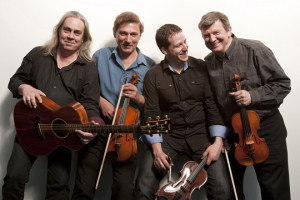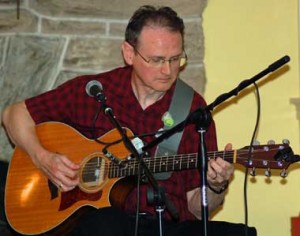Legendary Irish fiddler Kevin Burke is wrestling with what he suspects is an insoluble problem.
“I’m looking for a job,” Burke says. “I need to get a proper job. I’m still waiting for one to come along. In the meantime, I’m playing the fiddle.”
For now, that fiddle thing seems to be working out OK. Burke’s career includes membership in the iconic Bothy Band and Patrick Street. His always fresh, bright style of play is on full display throughout countless collaborations, including an early relationship with Arlo Guthrie—and, more recently, a marvelous album with the superb Portland, Oregon, guitarist Cal Scott. The New York Times once described Burke as “one of the great living Celtic fiddlers.” No doubt, he’s gratified to be counted among the living. So rest easy. Kevin Burke seems to be paying the bills.
Burke is also one of the founders of a brilliant international musical partnership called the Celtic Fiddle Festival. In 1993, Scottish fiddler Johnny Cunningham joined Burke, together with famed Breton Christian Lemaître, to merge the distinctive musical influences of the world’s fiddle hot spots. Regrettably, Cunningham passed away in 2003. Québécois fiddler André Brunet joined the lineup not long after Cunningham’s death. The great Nicolas Quemener accompanies the group on guitar. The four recently released a triumphant album, “Live in Brittany,” recorded in Quemener’s home town of Guémené-sur-Scorff.
.
The eclectic ensemble is touring now, and will appear in concert Thursday night, October 17, at the Sellersville Theater. The show starts at 8.
It’s hard to believe the idea is so long-lived, Burke reflects.
“When we did it, it was kind of an experiment. We thought many people would find it moderately interesting and amusing. We didn’t think it would go any further than that. Now, it’s almost like a band, even though the personnel has changed.
“The Celtic Fiddle Festival stands for this amalgamation of this kind of music, even though we’re all playing the same instrument. What Johnny and I thought would be a one-off has become part of the folk music establishment, which is great. If you go back 20 or 30 years ago, Breton and Québéc fiddling were not as well known here. Even among the Irish music fans, a lot were not quick to embrace music from other areas, even though there are obvious strong ties there. Now they see that this amalgamation is not an oddity, but something they can take for granted.”
Twenty years on, the band still hasn’t lost its propensity to surprise. Fans frequently discern a little tweak or twist they haven’t heard in previous performances. They’re not alone. Burke says he always hears something new. Each fiddler’s style reflects the musical influence and sensibilities of his native region, but each comes from a different creative starting point.
“We all play solo to show how unique each style is, and how they’re quite connected,” Burke explains. “It doesn’t take much for one to fit with another. We try to choose pieces of music that demonstrate that. It’s a fun bunch of guys, and it’s always challenging because the repertoire is not exactly native to me, you know, but that’s part of the fun—learning more and more about the Breton and Québéc music. André and Christian seem to have an endless store of knowledge about my own music. I hope, if you were talking to them, they would say the same thing about me.”
After all these years, Celtic Fiddle Festival remains true to its roots.
Burke believes his his co-founder would be pleased, but in his own distinctive way. With a laugh, Burke remembers how Cunningham sized things up. “Johnny used to say that we demonstrate how three cultures can be destroyed by one common instrument.”
You’ll be forgiven if you don’t see it the same way.


